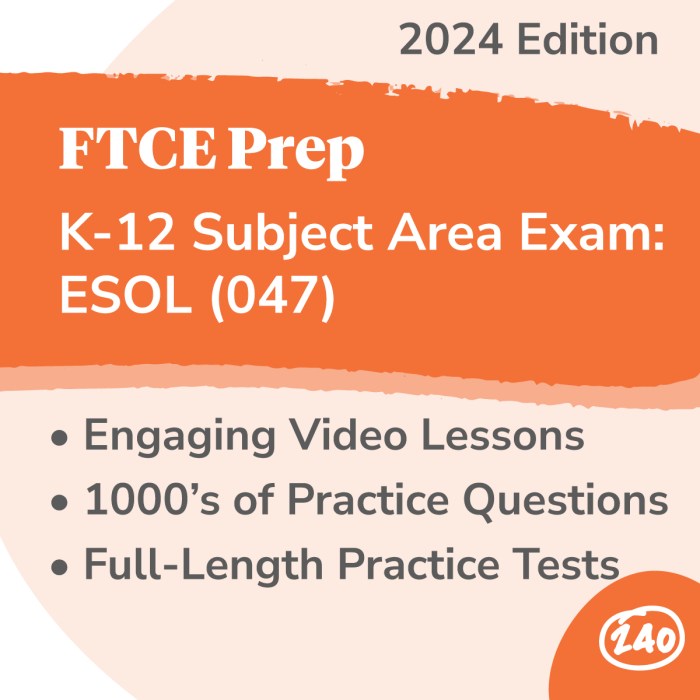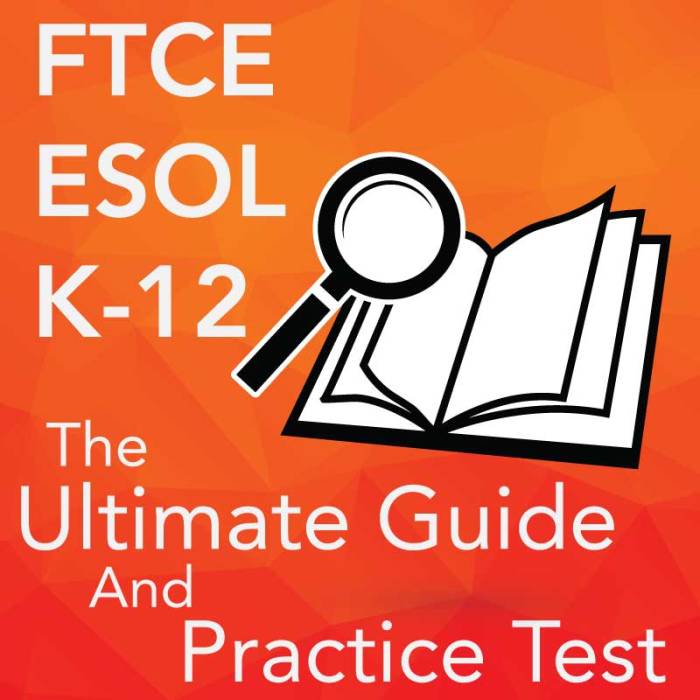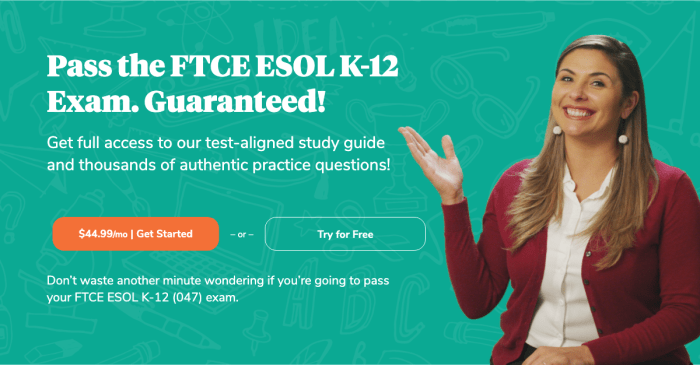Embark on a transformative journey with the FTCE ESOL K-12 Study Guide, your ultimate companion for success in teaching English to Speakers of Other Languages. This guide unlocks a wealth of knowledge and strategies, empowering you to excel in this dynamic field.
Within these pages, you’ll delve into the intricacies of the FTCE ESOL K-12 exam, gaining a deep understanding of its format, content areas, and scoring system. Prepare yourself for the challenges ahead with confidence, as we guide you through the essential study resources and proven test-taking strategies.
FTCE ESOL K-12 Overview

The Florida Teacher Certification Examinations (FTCE) ESOL K-12 exam is a state-mandated test for educators seeking certification to teach English for Speakers of Other Languages (ESOL) in grades K-12 in Florida. This exam assesses candidates’ knowledge and skills in teaching ESOL students, ensuring they are equipped to meet the unique needs of this diverse population.
The FTCE ESOL K-12 exam consists of two subtests:
- Subtest 1: Foundations of ESOL Education (60% of total score)
- Subtest 2: Instructional Practices for ESOL Education (40% of total score)
The exam is scored on a scale of 100-300, with a passing score of 220. Candidates who pass the exam will receive their ESOL K-12 certification.
Eligibility and Registration
To be eligible for the FTCE ESOL K-12 exam, candidates must hold a bachelor’s degree and meet specific coursework requirements in ESOL education. Candidates can register for the exam online through the Florida Department of Education website.
Study Guide Resources

Preparing for the FTCE ESOL K-12 exam requires effective study materials. This section provides guidance on finding and selecting reputable resources that align with the exam content and objectives.
When choosing study materials, consider the following factors:
- Credibility:Look for resources from reputable publishers, organizations, or educators with expertise in ESOL education.
- Comprehensiveness:Ensure the materials cover all the key concepts and skills tested on the exam.
- Relevance:Choose resources that focus specifically on the FTCE ESOL K-12 exam and its content.
- Variety:Use a combination of study materials, such as textbooks, practice questions, online resources, and study guides, to enhance your learning experience.
Reputable Study Guides
The following study guides are highly regarded for their quality and effectiveness:
- FTCE ESOL K-12 Study Guide: Comprehensive Preparation for Your Examby Exam Sam
- FTCE ESOL K-12 Exam Secrets: Study Guide, Practice Test, and Strategiesby Mometrix Test Preparation
- FTCE ESOL K-12: Certification Study Guideby Test Prep Books
Tips for Finding and Selecting Effective Resources
In addition to the study guides mentioned above, explore the following resources:
- FTCE Website:The official FTCE website provides detailed information about the exam, including sample questions and study resources.
- Online Forums and Discussion Boards:Engage with other candidates and educators on online platforms to exchange tips and insights.
- ESOL Professional Development Courses:Attend workshops or courses offered by universities, educational organizations, or professional development providers to enhance your knowledge and skills.
Content Areas and Skills: Ftce Esol K-12 Study Guide
The FTCE ESOL K-12 exam covers a comprehensive range of content areas and skills essential for educators working with English learners in grades K-12. Candidates must demonstrate a deep understanding of these areas to effectively support the academic and linguistic development of their students.
Content Areas
The exam encompasses the following core content areas:
- Language Development and Acquisition:Understanding the principles of language development and acquisition, including theories, research, and best practices.
- Instructional Strategies:Knowledge of effective instructional strategies for teaching English learners, including differentiated instruction, scaffolding, and technology integration.
- Assessment:Skills in assessing English learners’ language proficiency, academic achievement, and cultural background.
- Culture and Diversity:Understanding the cultural and linguistic diversity of English learners, as well as strategies for creating inclusive and culturally responsive learning environments.
- Professionalism:Knowledge of ethical and legal responsibilities, collaboration with colleagues and parents, and professional development opportunities for ESOL educators.
Skills and Knowledge
Within these content areas, candidates are expected to demonstrate the following skills and knowledge:
- Understanding the principles of second language acquisition and development.
- Applying effective instructional strategies for teaching English learners.
- Assessing English learners’ language proficiency and academic achievement.
- Creating culturally responsive and inclusive learning environments.
- Collaborating with colleagues, parents, and the community.
- Maintaining ethical and legal standards in ESOL education.
Test-Taking Strategies
Preparing for and taking the FTCE ESOL K-12 exam requires effective strategies to maximize success. This section explores practical techniques for managing time, analyzing questions, reducing stress, and practicing with sample questions.
Time management is crucial. Allocate time wisely, prioritizing challenging questions and leaving sufficient time for review. Familiarize yourself with the exam format and time constraints beforehand.
Question Analysis
Read questions carefully, identifying key concepts and instructions. Highlight important information and eliminate answer choices that are clearly incorrect. Consider the context of the question and apply your knowledge of ESOL teaching principles.
Stress Reduction Techniques
Managing stress is essential for clear thinking. Practice relaxation techniques, such as deep breathing or visualization, before and during the exam. Stay hydrated and maintain a positive mindset. Remember that the exam is an opportunity to demonstrate your skills and knowledge.
Studying for the FTCE ESOL K-12 exam can be a challenge, but there are resources available to help you succeed. One helpful resource is the Queen of the South OES website. This site provides free study materials, practice tests, and other resources that can help you prepare for the exam.
By utilizing these resources, you can increase your chances of passing the FTCE ESOL K-12 exam and becoming a certified ESOL teacher.
Practice Questions
Regular practice with sample questions enhances familiarity with the exam format and question types. Analyze practice questions thoroughly, identifying the correct answer and understanding the rationale behind it. Utilize online resources or study guides that provide practice questions with detailed explanations.
Example:
- Which of the following is an effective strategy for teaching English language learners?
- Using visuals and real-life examples
- Focusing solely on grammar rules
- Ignoring cultural differences
The correct answer is (a) Using visuals and real-life examples. This approach aligns with best practices for ESOL teaching, which emphasize making learning meaningful and engaging.
Practice and Self-Assessment

Consistent practice and self-assessment are crucial for success on the FTCE ESOL K-12 exam. Engaging in regular practice helps solidify your understanding of the content, while self-assessment allows you to pinpoint areas that need improvement.
There are various ways to practice for the exam. One effective method is to take mock exams that simulate the actual test experience. This provides you with a realistic assessment of your knowledge and skills, and helps you identify any weaknesses.
Online Quizzes, Ftce esol k-12 study guide
Online quizzes offer a convenient and flexible way to practice. They typically cover specific content areas or skills, allowing you to focus on areas where you need additional support.
Progress Evaluation
Regularly evaluate your progress by reviewing your practice results. Note areas where you consistently perform well and those where you struggle. This will help you tailor your study plan and focus on improving specific skills or content areas.
Tips for Improvement
- Identify your strengths and weaknesses.
- Focus on improving areas where you struggle.
- Review the content thoroughly and practice regularly.
- Take advantage of online resources and practice materials.
- Seek feedback from teachers or mentors to gain insights and improve your performance.
Additional Tips and Resources

Success on the FTCE ESOL K-12 exam requires a combination of preparation and support. By following these tips and utilizing the available resources, you can increase your chances of achieving a passing score.
One of the most important aspects of preparation is creating a study schedule. This will help you stay organized and on track with your studies. Make sure to allocate enough time for each content area and to practice answering test questions.
It is also helpful to seek support from others, such as a study group or tutor. They can provide you with feedback and encouragement.
Helpful Resources
In addition to the study guide, there are a number of other resources available to help you prepare for the FTCE ESOL K-12 exam. These include:
- Professional development courses
- Online forums
- Practice tests
Professional development courses can provide you with in-depth instruction on the content areas covered on the exam. Online forums can be a great way to connect with other test-takers and get advice and support. Practice tests can help you identify areas where you need additional study.
Accommodations and Resources for Test-Takers with Disabilities
Test-takers with disabilities may be eligible for accommodations on the FTCE ESOL K-12 exam. These accommodations can include extended time, a quiet testing environment, or assistive technology. To request accommodations, you must contact the Florida Department of Education’s Office of Assessment and Accountability.
Quick FAQs
What is the purpose of the FTCE ESOL K-12 exam?
The FTCE ESOL K-12 exam assesses the knowledge and skills required to teach English to Speakers of Other Languages (ESOL) in grades K-12.
What are the content areas covered on the exam?
The exam covers six content areas: Language Acquisition and Assessment, Instructional Planning and Delivery, Language Proficiency, Cultural Awareness, Linguistics, and Professional Responsibilities.
How can I prepare effectively for the exam?
Utilize reputable study guides, practice questions, and online resources. Create a structured study plan, allocate ample time for practice, and seek support from mentors or colleagues.